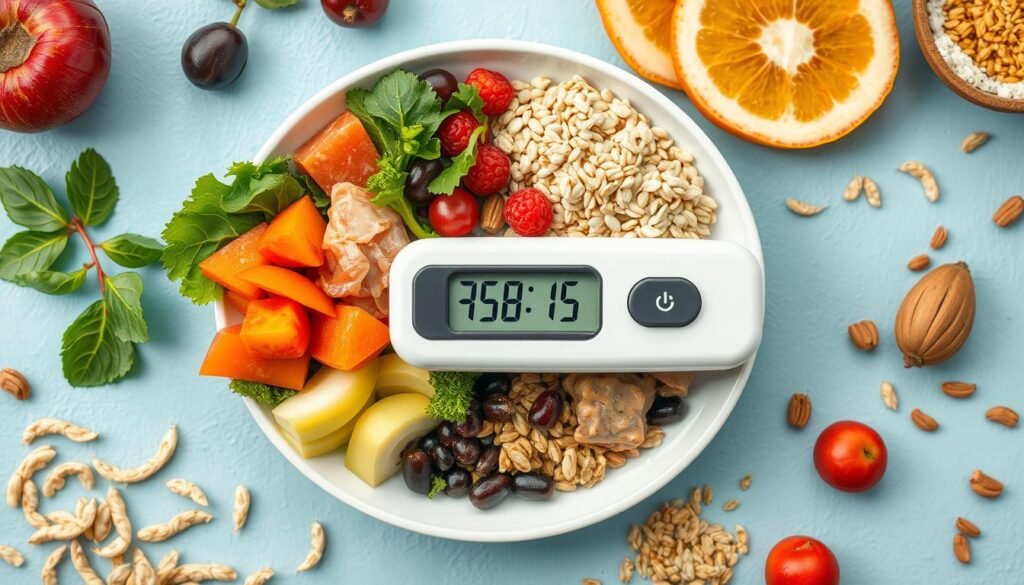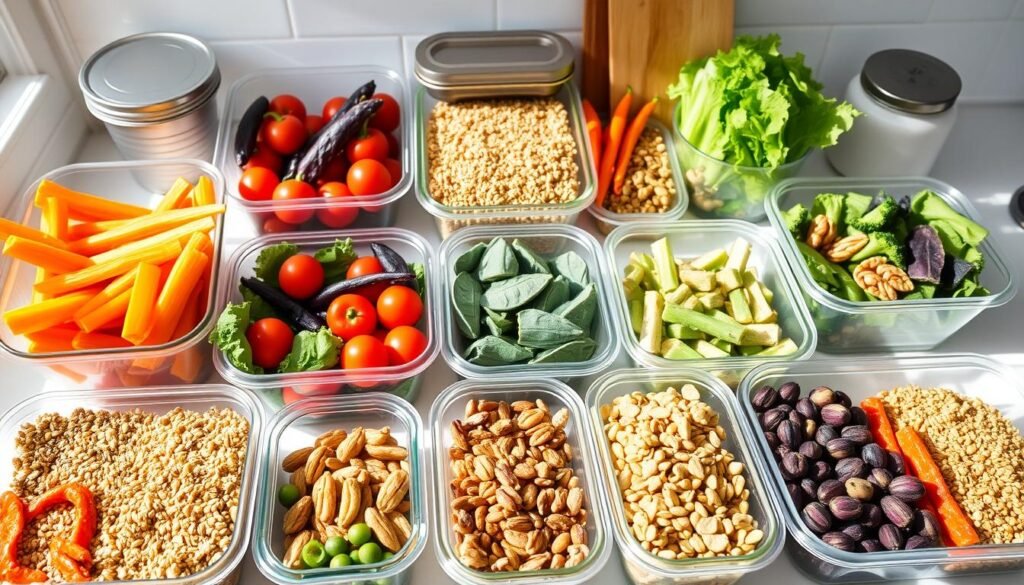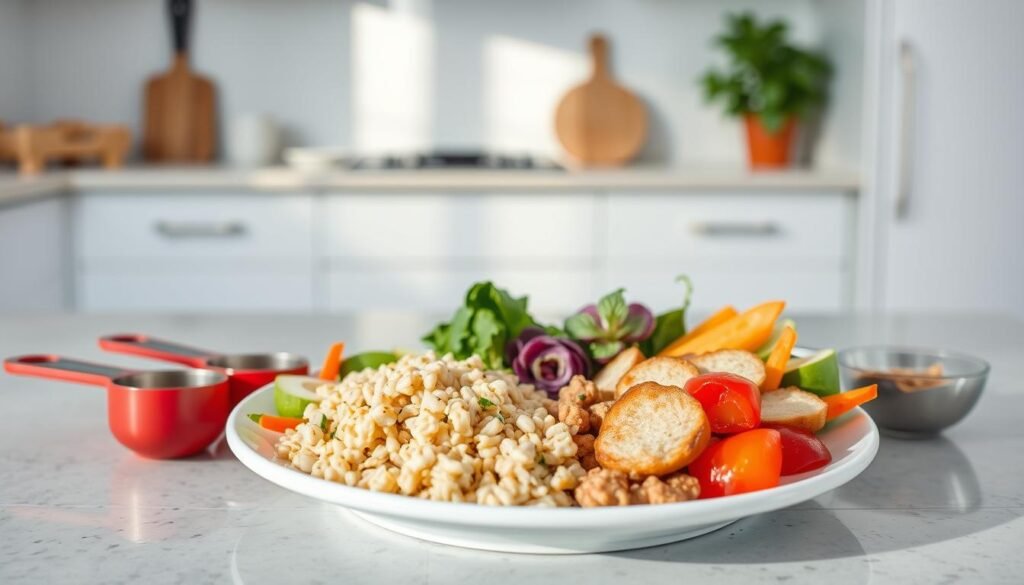Polycystic Ovary Syndrome (PCOS) impacts about 1 in 10 women in the U.S. It’s known for hormonal and metabolic issues. These problems can lead to obesity and insulin resistance. Making the right diet changes can help improve symptoms and life quality.
This piece shares important diet tips for dealing with PCOS. A balanced diet is key in facing PCOS challenges. It boosts chances for a healthier life. By choosing good nutrition plans, you can start to manage PCOS better. Let’s see how diet and nutrition changes can empower women on their health journey.
Key Takeaways
- Knowing how diet affects PCOS can lead to improved health.
- Eating healthy is crucial for managing insulin resistance in PCOS.
- Planning your meals helps make your diet efforts more successful.
- Control your portions for better weight management and health.
- It’s important to eat a variety of whole foods for the nutrients.
- Mindful eating supports better digestion and weight control.
Understanding PCOS and Its Impact on Health
Polycystic Ovary Syndrome (PCOS) affects many women who are able to have children. It’s key to understand how PCOS affects health to manage and treat it well. Women with PCOS may have irregular periods, gain weight, develop acne, and see more hair growth. These symptoms can really affect their daily life and happiness.
At its core, PCOS is about hormonal imbalances. This includes problems with insulin and high levels of androgens. When the body can’t use insulin right, controlling blood sugar becomes hard. This often leads to more weight gain. Studies show that about 10% of women in their fertile years have PCOS, showing how common it is.
Groups that focus on PCOS stress the need for changes in lifestyle to deal with symptoms. Eating healthy and exercising help balance hormones and boost health. Knowing how PCOS affects health empowers women to deal with it in an informed way.
| Symptom | Impact on Health | Management Strategies |
|---|---|---|
| Irregular Periods | Increased risk of infertility | Hormonal therapy, lifestyle changes |
| Weight Gain | Higher likelihood of Type 2 diabetes | Diet management, exercise |
| Acne | Impact on self-esteem | Skincare, hormonal regulation |
| Excessive Hair Growth | Emotional distress | Medications, laser therapy |
Importance of Nutrition in Managing PCOS
Nutrition is key in managing PCOS and boosting health. A diet that includes whole foods and balanced nutrients can improve hormone health. These foods help lower inflammation, balance hormones, and help in keeping a healthy weight.
Studies have highlighted the benefits of a diet high in foods that fight inflammation. Foods like leafy greens, berries, and fatty fish help with hormone balance. But processed and sugary foods might make PCOS worse.
It’s crucial to understand how nutrition affects PCOS management. Eating fiber-rich grains, lean proteins, and healthy fats is important. They help with insulin sensitivity, which is key to easing PCOS symptoms. This approach to diet can make managing PCOS simpler.
| Nutrition Focus | Benefits |
|---|---|
| Anti-inflammatory Foods | Reduce inflammation and support hormonal balance. |
| Balanced Macronutrients | Enhance insulin sensitivity and weight management. |
| Whole Foods | Improve overall health and decrease symptoms. |
Diet Tips for Balanced Blood Sugar Levels
It’s important to manage blood sugar levels, especially for those with PCOS. A balanced diet can stabilize glucose and insulin levels, which is key for managing symptoms. Adding low glycemic index foods to your diet can help.
Incorporating Low Glycemic Index Foods
Low glycemic index (GI) foods cause a slower increase in blood sugar. This category includes:
- Whole grains like brown rice and quinoa
- Legumes such as lentils and chickpeas
- Non-starchy vegetables like spinach and broccoli
These foods are packed with nutrients that help control blood sugar. By choosing low GI foods, you can keep your energy up all day and fight insulin resistance.
Avoiding Sugar and Processed Carbs
It’s also critical to cut down on sugar and processed carbs. These can cause rapid rises in blood sugar and insulin, making PCOS worse. Avoid processed carbs like:
- White bread and pastries
- Sugary cereals and snacks
- Sweetened beverages and candies
Studies show that too much refined sugar worsens insulin resistance. Making better food choices can help stabilize your metabolism. For more tips on controlling blood sugar with diet, check out this resource.

| Food Type | Examples | Impact on Blood Sugar |
|---|---|---|
| Low Glycemic Index Foods | Whole grains, legumes, non-starchy vegetables | Promote stable blood sugar levels |
| Sugar | Sweets, sugary drinks | Cause spikes in blood sugar |
| Processed Carbs | White bread, pastries | Lead to increased blood sugar fluctuations |
Meal Planning for PCOS: Strategies for Success
Effective meal planning is key in managing PCOS and encouraging healthy eating habits. A thought-out meal plan for the week makes grocery shopping simpler. It also ensures you always have nutritious meals ready. By including batch cooking, you make meal prep both easy and efficient.
Creating a Weekly Meal Plan
Creating a weekly meal plan is like drafting a roadmap for healthy eating. You can customize this plan with foods that help balance hormones and improve health. Here are tips to craft a successful meal plan:
- Identify personal dietary preferences and restrictions.
- Plan meals around whole foods that are rich in nutrients.
- Incorporate a balance of proteins, healthy fats, and carbohydrates.
- Consider using apps or templates that help streamline the planning process.
Batch Cooking for Convenience
Batch cooking is a top-notch method for lasting meal planning. It lets you cook large meal amounts at once, aiding your healthy diet all week. Benefits of batch cooking include:
- Time-saving: Reduces the daily cooking burden.
- Portion control: Helps in managing serving sizes effectively.
- Reduced food waste: Encourages utilizing ingredients fully before spoilage.
- Variety and convenience: Provides easy access to different meals and snacks.

Portion Control: A Key to Effective Weight Loss
Understanding portion control is crucial for effective weight loss. It’s particularly important for those with Polycystic Ovary Syndrome (PCOS). By knowing the right portion sizes, people can avoid overeating. This helps maintain a balanced diet. It’s also key in managing PCOS with a focus on whole foods.
Understanding Serving Sizes
Serving sizes are the suggested amounts of food to eat at meals. Knowing what these amounts look like can help control calorie intake and ensure a diet that’s well-rounded. For instance, a protein serving should be as big as a deck of cards, and grains should be the size of a computer mouse. Following these size guides can lead to successful weight loss.
Using Measuring Tools for Accurate Portions
Using measuring tools like food scales and cups is a smart way to control portions. They make it easy to know exactly how much you’re eating. This can make sticking to your diet goals simpler. For better health and managing PCOS symptoms, these tools are very useful. For more diet tips, check out this helpful resource.

| Food Group | Recommended Serving Size | Common Measuring Tool |
|---|---|---|
| Fruits | 1 medium fruit or 1 cup | 1 cup measuring cup |
| Vegetables | 1 cup raw or ½ cup cooked | 1 cup measuring cup |
| Grains | ½ cup cooked or 1 slice of bread | 1/2 cup measuring cup |
| Protein | 3 ounces (about the size of a deck of cards) | Food scale |
| Dairy | 1 cup or 1 ounce (cheese) | 1 cup measuring cup |
Healthy Eating: Focus on Whole Foods
Eating whole foods is key to better health, especially for those with PCOS. Including fruits and vegetables improves well-being. They’re packed with vitamins, minerals, and fiber needed for the body to function well.
Benefits of Fruits and Vegetables
Fruits and vegetables are crucial for healthy eating. They offer important nutrients and help control weight and sugar levels. They also provide antioxidants, fighting inflammation and aiding hormone balance. Good choices include:
- Berries
- Leafy greens
- Broccoli
- Sweet potatoes
- Citrus fruits
Having these foods regularly betters digestion and mood. Learn more about clean eating at eating clean.
Choosing Lean Proteins and Healthy Fats
Lean proteins and healthy fats are vital for healthy eating. Choose chicken, turkey, fish, and legumes for protein. These support muscles and health. Avocados, nuts, and olive oil provide healthy fats. They’re good for hormone balance and feeling full.
| Food Type | Examples | Health Benefits |
|---|---|---|
| Lean Proteins | Chicken, Fish, Legumes | Support muscle health, regulate hormones |
| Healthy Fats | Avocados, Nuts, Olive Oil | Promote heart health, enhance fat metabolism |
Focusing on these foods promotes balanced nutrition. It’s a big step for PCOS individuals towards health.
Calorie Counting: Is It Right for You?
Calorie counting can help those wanting to manage their weight. This is especially true for individuals with conditions like PCOS. It’s essential to know how to track daily calories to meet health goals. This method works if it matches your health needs and lifestyle choices.
How to Track Daily Caloric Intake
There are many ways to keep an eye on daily calories. Some popular methods are:
- Mobile apps, such as MyFitnessPal or Lose It!
- Food diaries for writing down meals and snacks
- Label reading to understand portion sizes and their calories
This approach helps people be more mindful about food. It aids in making smart choices about how many calories to consume.
Balancing Calories for Sustainable Weight Management
To manage weight long-term, balancing calories in and out is key. Some strategies include:
- Adding regular physical activity to your day
- Knowing your metabolic rate to figure out calorie needs
- Setting goals that are realistic and reachable for weight loss
Focusing on consistency and balance is better than severe restriction. By tracking calories and prioritizing nutritious food, long-term weight success is more achievable.
Mindful Eating Practices for Better Digestion
Mindful eating can greatly improve digestion and health, especially in women with PCOS. It helps us connect deeply with our food. This way, we understand what our bodies really need. We become better at noticing when we’re hungry or full. This doesn’t just help digestion. It also aids in keeping a healthy weight.
Recognizing Hunger and Fullness Cues
Knowing when we’re truly hungry or just full is key to mindful eating. It stops us from eating based on our emotions instead of real hunger. When we pay attention to our body’s signals, we eat in a way that truly nourishes us. This is very important for people managing PCOS. It helps them find a balanced way to enjoy their meals.
Eliminating Distractions During Meals
Getting rid of distractions like TV or phones at mealtime is crucial. Without these distractions, we can focus fully on enjoying our meal. This focus can make us feel satisfied with less food. We can easily recognize when we’re full. The Academy of Nutrition and Dietetics has shown that eating mindfully is great for digestion and managing weight. It’s especially useful for those dealing with PCOS.